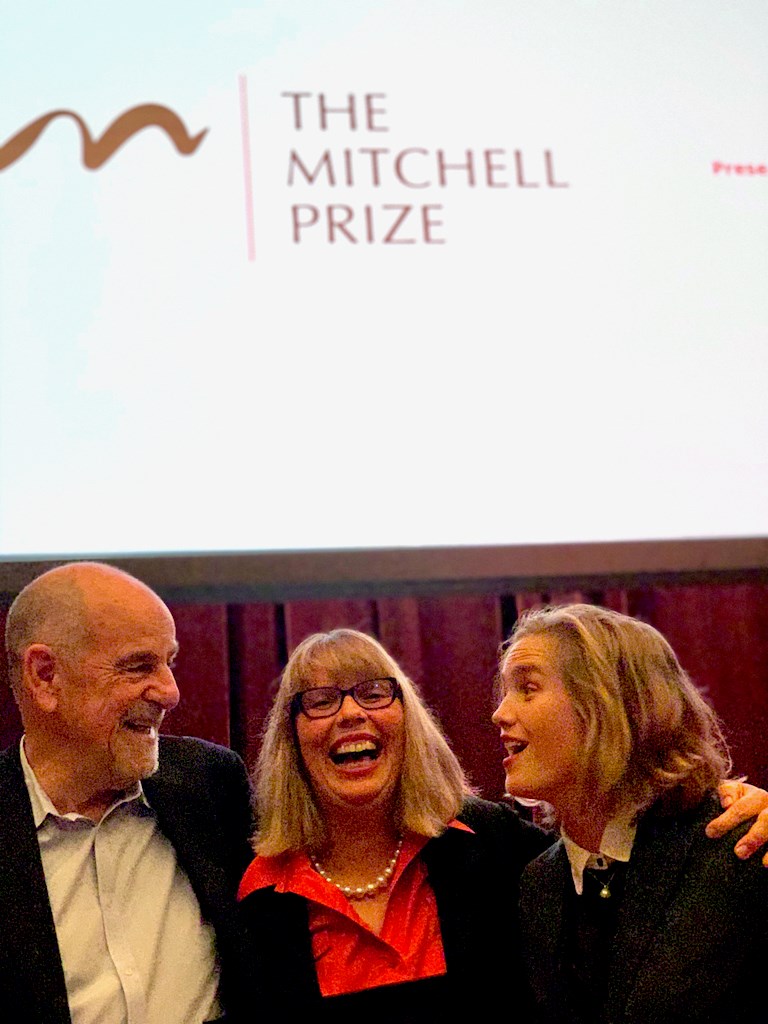I liked the old gods before they slipped into the bunker. – “Anthropocene”
Through doves and stars, cedars and sea lions, Susan Alexander grapples with the climate crisis and grief in her prize-winning suite of poems, Vigil. The islander received the $20,000 Ross and Davis Mitchell Prize for religious faith and poetry in a ceremony at the Aga Kahn Museum in Toronto last month.
Image journal presents the prize every two years to a Canadian poet, selected by jury, “whose work wrestles with the beauty and complexity of religious faith.” This is just the second time the prize has been awarded.
“I was so delighted when I found out I got on that shortlist,” says Alexander. She’d decided to apply for the prize just a month before the deadline at the urging of a friend who knew she was a person of faith.
“So I went through a lot of my poems and I realized…I’ve been writing a lot, because it’s really what’s kind of on my heart these days, [about] the environment and the climate crisis.”
Through her poems, Alexander confronts her implication in the growing environmental emergency.
“I’ve very much benefited from fossil fuels,” she says. “Nobody but the kids aren’t implicated in this crisis.
“And I started writing about it.
“Friends of mine are involved in My Sea to Sky and a lot of Howe Sound issues and so I’ve been just watching locally just how difficult it is to make changes.”
Alexander says she’s been influenced by people like local filmmaker Bob Turner, who is known for his narrative films of close encounters with marine life in the sound. The final poem in the suite, “Canticle for sea lions in Howe Sound” (a canticle is a hymn or chant) contrasts sea lions barking outside an open window with the approved LNG plant and McNab estuary gravel mine. The creators of the Bowen/Nexwlélexm Marine Atlas (this crew includes Turner) have already asked to include the poem in their upcoming publication.
The Mitchell Prize’s five finalists, who could be of any faith and write on any topic, were flown to Toronto and put up in a hotel for the night. “That was the biggest thing I’d ever had, really, as a poet,” says Alexander.
The islander of more than 25 years describes herself as a relative newcomer to the poetry scene with 15 years of serious poetry writing under her belt (though she’s been a writer for much longer). Praise has met Alexander’s work in recent years: in 2016 she was awarded the Short Grain poetry prize, in 2018 she was longlisted for the CBC Poetry Prize and her poem “Scales” from her book The Dance Floor Tilts was selected for the Poetry in Transit program.
But the Mitchell Prize was a whole other level for Alexander.
Each finalist was to recite one of their poems at the ceremony. Alexander read out the Bible-riffing “Intercession” (an intercession is saying a prayer on behalf of someone else) at once a history lesson and critique of modern consumption. (“We lift up to You not only our petroleum sins of oil and gas,/but also by-product spinoffs and our plastic iniquities…”)
“It had to take three minutes. This is a bit longer than three minutes,” says Alexander. “I read this one because I thought this might be my only chance to say this.”
Though the distinctly theological titles of Alexander’s poems sometimes require a dictionary, the content is accessible, for islanders perhaps because the landscape is so familiar. Though some poems are about personal grief and loss, Alexander roots them in the natural, often Bowen, world.
“I find God in nature,” says Alexander. “I go to the cathedral downtown, the Anglican Cathedral, because I love the community, and it’s got beautiful music and beautiful liturgy, and it’s a beautiful building, and it’s got a nice broad open liberal theology…[but] when I need to restore my soul. I have to get in the woods or by the ocean, sit on a beach.
“I feel like I can encounter the divine in the natural world.”
There’s a deep grief throughout Alexander’s suite, almost despair. Asked if she has hope for the future, Alexander says she’s uncertain.
“I feel like it’s naive to hope but it’s not naive to work,” she says. “I really celebrate people who are getting out there and doing the hard work to change things. Whether they’re lobbying governments or whether they’re just raising consciousness.”
“There’s a lot we can do, a lot that can be done, but…I feel like time’s running out,” says Alexander “When I look at the government, our government and look at the United States I don’t see much willingness. I mean, quite the opposite.”
Alexander’s husband Ross and daughter Libby, along with a few of Alexander’s friends, attended the Mitchell Prize ceremony. When Alexander’s name was called, it took a few seconds for the news to sink in.
“[Libby] levitated screaming and then she looked and I hadn’t moved. She thought, ‘Oh Mom, I thought I’d heard it wrong!’” laughs Alexander. But win she did.
Unfortunately for Bowen Islanders curious about the suite, all the poems are still unpublished. Some poems are being considered for a magazine and another is to be part of the marine atlas. Alexander says she isn’t sure they’ll ever be published as a collection, though she likes the idea.
In the meantime, Alexander is $20,000 wealthier but she’s not planning on keeping the money.
“I’m going to look for projects. ” she says. “I think that would feel good for me to use the money to support what’s the heart of the actual these poems.”
When she'd been considering whether she had hope for the future, Alexander mulled over the question. “I guess I am a hopeful person,” she concluded.
So I must lie awake with my window open, listen/there now can you hear them?––“Canticle for sea lions in Howe Sound”



